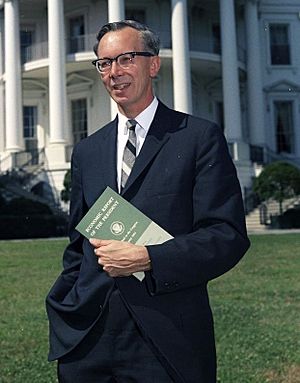Walter Heller facts for kids
Quick facts for kids
Walter Heller
|
|
|---|---|
 |
|
| 5th Chair of the Council of Economic Advisers | |
| In office January 29, 1961 – November 15, 1964 |
|
| President | John F. Kennedy Lyndon Johnson |
| Preceded by | Raymond Saulnier |
| Succeeded by | Gardner Ackley |
| Personal details | |
| Born | August 27, 1915 Buffalo, New York, U.S. |
| Died | June 15, 1987 (aged 71) Silverdale, Washington, U.S. |
| Political party | Democratic |
| Education | Oberlin College (BA) University of Wisconsin, Madison (MA, PhD) |
Walter Wolfgang Heller (born August 27, 1915 – died June 15, 1987) was an important American economist in the 1960s. He was a trusted advisor to President John F. Kennedy, serving as the chairman of the Council of Economic Advisers from 1961 to 1964.
Contents
Early Life and Education
Walter Heller was born in Buffalo, New York. His parents, Gertrude and Ernst Heller, were immigrants from Germany. Ernst Heller was a civil engineer.
Walter went to Shorewood High School in Shorewood, Wisconsin. After high school, he attended Oberlin College in 1931 and earned his bachelor's degree in 1935. He then continued his studies at the University of Wisconsin, where he earned both his master's and doctorate degrees in economics.
Helping the U.S. Economy
Walter Heller believed in a type of economic thinking called Keynesian economics. This idea suggests that governments should sometimes spend money or cut taxes to help the economy grow.
Tax Cuts and Economic Growth
Heller strongly supported cutting federal income tax rates. He believed this would encourage people to spend and invest more, which would boost the economy. President Kennedy planned these tax cuts, and President Lyndon B. Johnson and Congress passed them after Kennedy's death. Many people believed these tax cuts helped the U.S. economy grow stronger.
Wage and Price Guidelines
Heller also created the first "voluntary" guidelines for wages and prices. These guidelines suggested how much companies should raise prices and how much they should increase workers' pay. The goal was to keep the economy stable and prevent prices from rising too fast. When the steel industry did not follow these guidelines, President Kennedy publicly criticized them, and the industry quickly agreed to comply.
Understanding Tax Rules
Heller was one of the first economists to point out that special tax deductions and tax preferences (like certain tax breaks) made the tax system more complicated. He explained that these rules meant the government had to set higher tax rates for everyone else to collect the same amount of money.
Working with Presidents
Walter Heller was a key advisor to two U.S. presidents during an important time in American history.
Advising President Kennedy
As chairman of the Council of Economic Advisers, Heller helped President Kennedy make important decisions about the economy. He played a big role in shaping the economic policies of the early 1960s.
The War on Poverty
The day after President Kennedy was assassinated, Heller met with President Johnson. To help the country recover and move forward, Heller suggested a big new plan called the "War on Poverty." This plan aimed to reduce poverty in the United States, and President Johnson was very excited about it.
Leaving Government Service
Later, President Johnson decided to increase the country's involvement in the Vietnam War. Heller believed that the government should raise taxes to pay for the war, but Johnson did not agree. Heller worried that spending so much money on the war without raising taxes would cause prices to rise quickly (inflation). Because of this disagreement, Heller resigned from his position.
International Contributions
Early in his career, Walter Heller also helped with important international projects.
The Marshall Plan
He helped create the Marshall Plan in 1947. This plan was a major effort by the United States to help rebuild Western European economies after World War II.
Rebuilding Germany
Heller was also important in helping to bring back the German currency after World War II. This step was very helpful in leading to a strong economic boom in West Germany.
Academic Career
After his time in government, Heller returned to teaching and research.
University of Minnesota
In 1945, Heller joined the University of Minnesota as an associate professor of economics. After serving in government, he returned to the university in the 1960s. He eventually became the head of the Department of Economics. He helped make the department one of the best in the country by hiring many talented economists. Some of these economists later won the Nobel Prize, including Leonid Hurwicz, Edward C. Prescott, Thomas J. Sargent, and Christopher A. Sims.
Legacy and Recognition
Walter Heller passed away in Silverdale, Washington, on June 15, 1987, at the age of 71. In 1999, the University of Minnesota honored him by renaming one of their buildings Walter W. Heller Hall. This building is on the Minneapolis campus and is used for student advising and classrooms.
See also
 In Spanish: Walter Heller para niños
In Spanish: Walter Heller para niños
 | Leon Lynch |
 | Milton P. Webster |
 | Ferdinand Smith |

